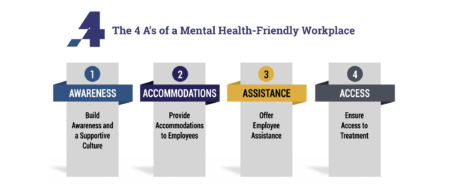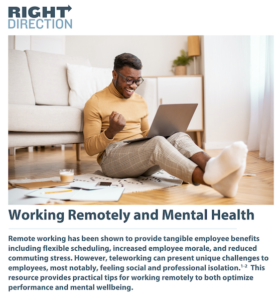
Encouraging good mental health
We’ve noticed increased reports of mental health concerns from employers this Autumn and our HR partner, All Things HR, also reports that Washington state employers are asking more questions about mental health. And more employers are asking the Approach Safety Team about employees who are distracted or showing worrying behaviour in the workplace.
That’s why we’re focusing on mental health this week. This column will look at resources for employers. And our Toolbox Talks this week features tips for employees to look after themselves.
“Mental health has a direct impact on workplace safety,” says Amy Davidson, safety manager at Approach. “A worried, distracted employee is more likely to make a mistake that could injure themselves or their co-workers.”
Mental health in 2020
There’s no question that 2020 is has been stressful. One doctor quoted by Healthline believes that 40 percent of Americans are dealing with depression caused by the pandemic — more than 131 million people.
“A worried, distracted employee is more likely to make a mistake that could injure themselves or their co-workers.”
And, COVID itself may lead to mental health problems. A new study released last week shows that 18 percent of those diagnosed with COVID-19 go on to be diagnosed with a mental health problem.
Our workplaces reflect the stressful times, especially because COVID has brought new requirements and ways of working to nearly every business. As Suzan Sturholm of All Things HR points out, “Business owners and employees have faced an overwhelming number of projects and responsibilities to keep their businesses afloat this year and it looks like that will continue into 2021. Many of us are dealing with burnout and emotional exhaustion.”
Supporting employees during COVID-19
EARN, a non-profit at Cornell University, has created a simple 4-point plan for supporting employee mental health:
The Center for Workplace Mental Health also has a four-step plan for mental health during COVID, called LEAD, which stands for:
- Leadership: “Even if leaders do not have all the answers, calm reassurance and normalizing how these difficult times are impacting everyone, including leaders, is helpful.”
- Effective Communication: “Although no one currently has all the answers on the pandemic, employers should acknowledge the uncertainty while gathering and sharing reliable updated information from trusted sources.”
- Adapt to Change: “Jobs must get done, but in these uncertain times setting reasonable expectations sends a message of support for employees.”
- Double Down on Access to Care: “Employers have a key role to play in ensuring employees can access effective, timely and affordable care.”
Their website, workplacementalhealth.org, also lists a number of resources and articles that might be helpful in your workplace.
The Right Direction website has a handout that helps employees and management with the best practices for working remotely or at home.

Safety and HR advice for mental health
This article from Safety and Health Magazine explores how safety professionals can help with mental health (or if they even should). If you’re a safety professional looking for more information on this, contact the Approach Safety Team, who have worked with many employers on this issue during 2020.
If you have an HR question related to mental health, the HR Help Desk (available to Approach clients) can share resources and templates to help you and your employees.
